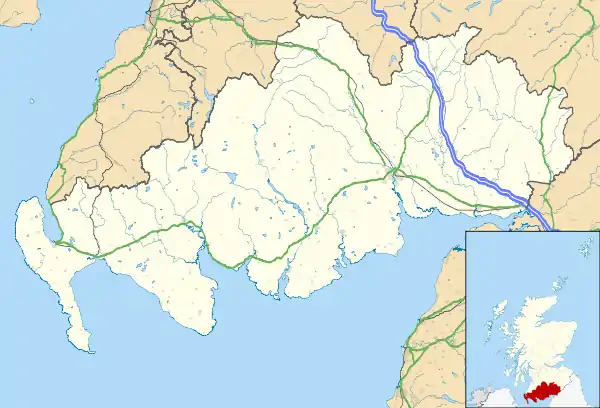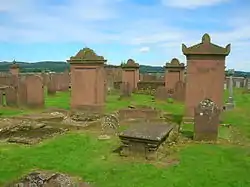Dunscore
Dunscore (['dʌnskər] / 'DUN-skur', less commonly ['dunskɔ:r] / 'DUN-score') is a small village which lies 9 miles (14 km) northwest of Dumfries on the B729, in Dumfriesshire, in the District Council Region of Dumfries and Galloway, southwest Scotland.
| Dunscore | |
|---|---|
 Dunscore village and War Memorial | |
 Dunscore Location within Dumfries and Galloway | |
| Council area | |
| Country | Scotland |
| Sovereign state | United Kingdom |
| Police | Scotland |
| Fire | Scottish |
| Ambulance | Scottish |
| UK Parliament | |
The village consists of about 150 people, has a community run pub, a post office and a tea room.[1] The village hosts a gala event every August.[2]
It is the birthplace of the Church of Scotland missionary Jane Haining, one of the only ten Holocaust victims from Scotland.
The Dunscore railway station opened in 1905, and closed to passengers in 1943 and to goods in 1949. The station was on the Cairn Valley Railway which ran to Moniaive from Dumfries.
Craigenputtock Estate is within the Civil Parish of Dunscore.
Etymology
The name Dunscore is of Cumbric origin, formed of the elements dīn 'fort' and *ïsgor 'fortification, rampart'.[3][4] William J. Watson proposes the meaning "fort of the bulwark or rampart".[5]
The Church

There is a parish church of Dunscore.[6]
The long abandoned Dunscore Old Kirk was located near Fardingwell Farm, between Robert Burns' Ellisland Farm and Robert Ferguson's "Isle Tower".
In Thompson's 1832 map, Ellisland was spelt "Elliesland" and was next to Isle Tower.[7]
The 'Laird of Lag's Tomb' is located at the surviving "Dunscore Old Kirk" burial ground, as is the grave of Captain Robert Riddell of Glenriddell, a close associate of Robert Burns.
The church was rebuilt into a heritage centre in 2017, and features information on the Dunscore-born Jane Haining.[8]
References
- "Village of Dunscore". Retrieved 20 February 2012.
- "Dunscore Village Gala". Retrieved 20 February 2012.
- James, Alan G. (2014). The Brittonic Language in the Old North: A Guide to the Place-name Evidence (PDF). Volume 2: Guide to the Elements. pp. 144, 215. Archived from the original (PDF) on 11 September 2014.
- James, Alan G. (2013). "P-Celtic in Southern Scotland and Cumbria: A review of the place-name evidence for possible Pictish phonology" (PDF). The Journal of Scottish Name Studies: 56.
- Watson, William J. (1925). "The Celts (British and Gael) in Dumfriesshire and Galloway" (PDF). Transactions and Journal of Proceedings of the Dumfriesshire and Galloway Natural History and Antiquarian Society. Third Series. XI: 147. Archived from the original (PDF) on 31 August 2014.
- "Dunscore Parish Church". Retrieved 20 February 2012.
- http://maps.nls.uk/atlas/thomson/view/?rsid=74400172&sid=74400174&mid=555
- https://www.visitscotland.com/info/see-do/dunscore-heritage-centre-p1652371
| Wikimedia Commons has media related to Dunscore. |
| Wikimedia Commons has media related to Old Dunscore Kirk. |
